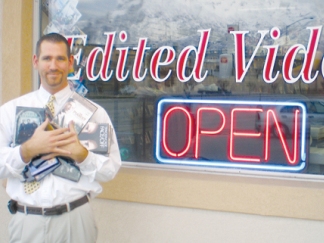Description from Toronto International Film Festival catalogue:
Mormons can be movie lovers too. The problem is that their religious leaders strongly discourage R-rated content. As one Mormon prophet explained, “The mind through which this filth passes is never the same afterwards.” In order to better serve their Mormon clientele, enterprising video stores in Utah started to offer “clean” versions of popular titles like The Matrix and Titanic. Using digital editing software, self-appointed censors removed nudity, gratuitous violence and profanity, then mass duplicated the clean versions for DVD rental. Soon the idea took off, and multiple franchises sought to capitalize on brands like Clean Flicks and Flick’s Club. For a brief spell, it seemed like the perfect business.
Unfortunately, no one consulted the copyright holders. Hollywood figures such as Steven Soderbergh, Curtis Hanson and Michael Mann became vocal opponents of having their work re-edited. As quickly as the clean movement blossomed, it started to unravel, with legal threats from Hollywood, accusations among rivals and even a sex scandal in the backroom of a clean video store.
In Cleanflix, directors Andrew James and Joshua Ligairi chronicle the rise and fall of the clean movement. Having grown up in the Mormon community, the duo gained close access to the main players that outsiders might never have achieved. The controversy over cleaning films raises further questions: Who gets to set cultural standards? Does what we watch affect how we behave?
The film gives a broader context for understanding the Mormon institution (known as the Church of Jesus Christ of Latter-day Saints) by talking to its adherents and those who have dropped out, most notably the playwright and filmmaker Neil LaBute, known for the dark themes in scripts like In the Company of Men and Bash.
As events unfold, one thing becomes clear: in movies, you can skip over the parts you don’t like. But in real life, you can’t.






